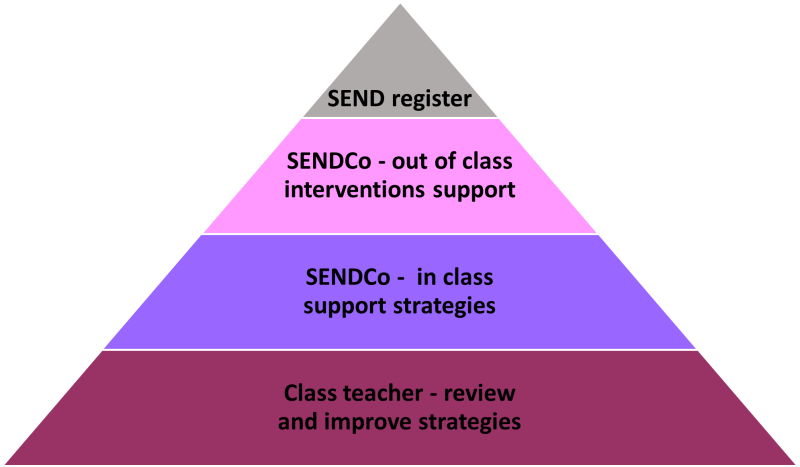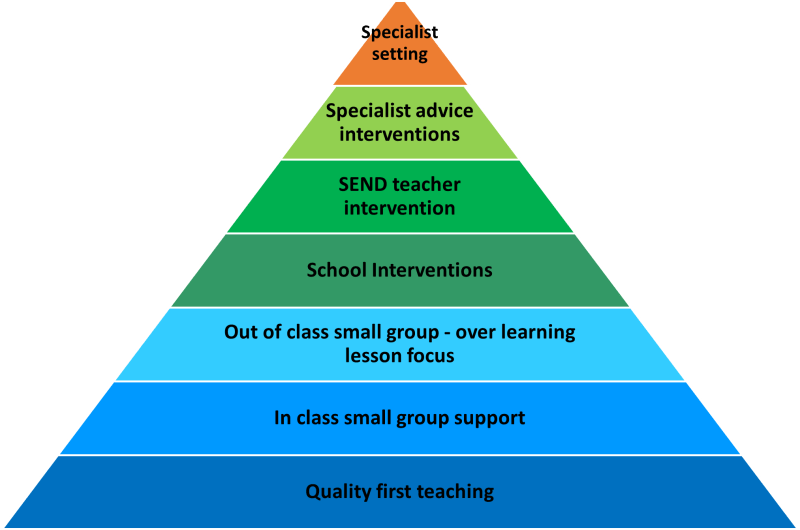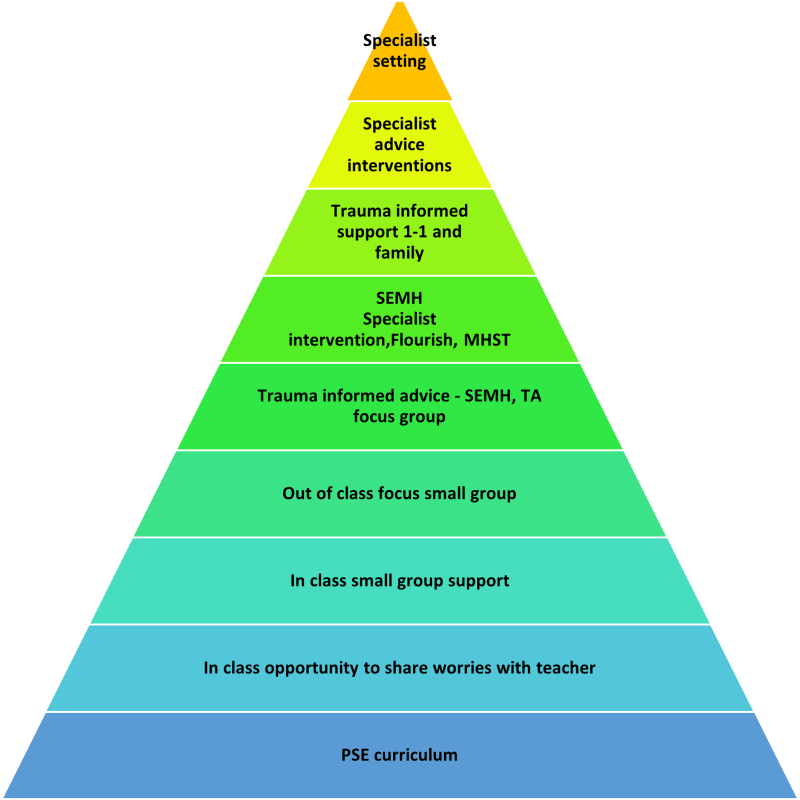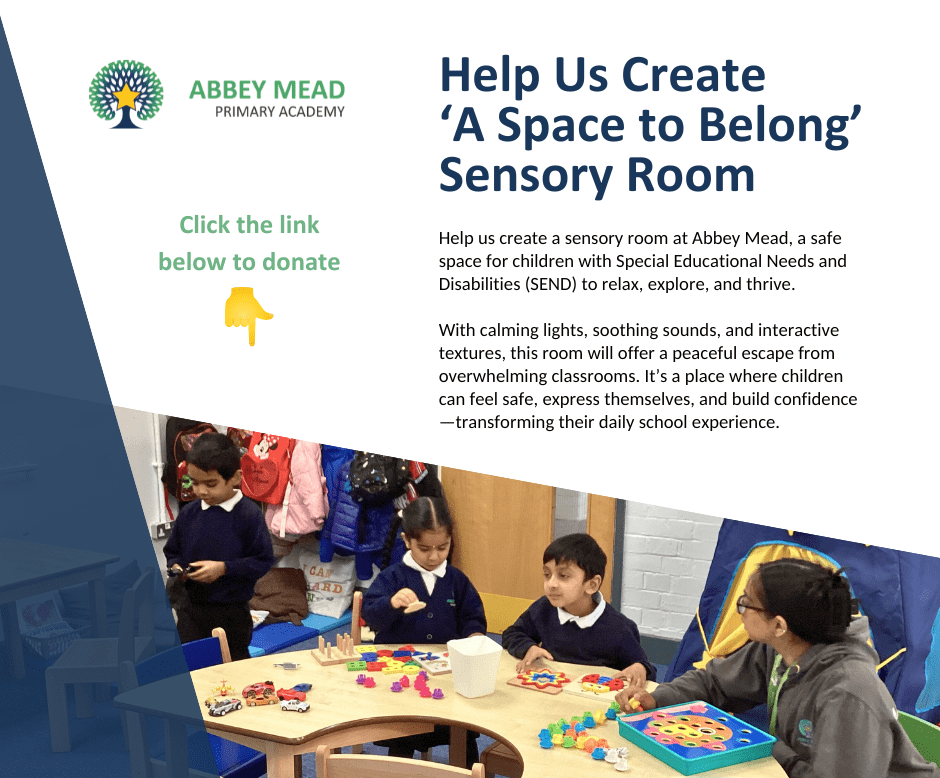| Academy Name |
Abbey Mead | |
| Age Range |
Primary | |
| Principal | Gary Aldred | |
| Special Educational Needs Coordinator (SENCo) | Bharti Jansari | |
| Governor with responsibility for SEND | Humairaa Seedat | |
| Staff with additional SEND responsibility |
Miss Hill
Mrs Richards Mrs Martin |
|
| Address | 109 Ross Walk Leicester LE4 5HH |
|
| Telephone number |
0116 2661809 | |
| Contact Information | Email (admin) Email (SENCo) |
[email protected] [email protected] |
| Local Offer Webpage Link | https://www.leicester.gov.uk/schools-and-learning/special-educational-needs-sen/ | |
Introduction
Abbey Mead is proud to be an inclusive school, valuing the individuality of all children. We are committed to giving all our children every opportunity to achieve the highest of standards. We do this by taking account of pupils’ varied life experiences and needs. We offer a broad and balanced curriculum and have high expectations of all our children. The achievements, attitudes and wellbeing of all our children matter and are celebrated.
What is SEND?
The Code of Practice 2014 states that:
‘A pupil has SEN where their learning difficulty or disability calls for special educational provision, namely provision different from or additional to that normally available to pupils of the same age.’
The Four broad areas of need identified within the SEN Code of Practice 2014 are:
- Communication and Interaction (e.g. speech articulation, stammering, speech and language delay, autism etc)
- Cognition and Learning (e.g. global learning difficulties, dyslexia, dyscalculia etc)
- Social, Emotional and Mental Health Difficulties (e.g. anxiety, depression, eating disorders, obsessive, compulsive disorder (OCD) etc)
- Sensory and Physical Needs (Visual impairment, hearing impairment, sensory needs (e.g. autism, dyspraxia, toileting issues, physical disability etc)
| Type of SEND | Type of Provision |
|---|---|
| Communication and Interaction (e.g. speech articulation, stammering, speech and language delay, autism etc) | We identify a pupil’s areas of need and consult with specialists for the most appropriate strategy or programme to support their progress. |
| Cognition and Learning (e.g. global learning difficulties, dyslexia, dyscalculia etc) | Initially, by careful observation, assessment, record keeping and consultation with parents and staff, we identify specific needs and determine the best supportive strategy or programme. If pupil progress is not augmented, then specialist advice will be sought for further support or assessment. |
| Social, Emotional and Mental Health Difficulties (e.g. anxiety, depression, eating disorders, obsessive, compulsive disorder (OCD) etc) | We carefully monitor the pupil’s behaviour to gain insight into their emotional state and the behaviours they show. Information gathering meetings with parents and all adults involved in a child’s life are used to identify the possible cause and a course of supportive action identified. Specialist advice and/or a referral to the appropriate specialist agency may be made. |
| Sensory and Physical Needs (Visual impairment, hearing impairment, sensory needs (e.g. autism, dyspraxia, toileting issues, physical disability etc) | These needs are identified when pupils receive a place at Abbey Mead Primary Academy via parents meeting with the admin staff. Any concerns are shared with the SENDCo and more detailed information is obtained from the parents and specialist agencies if appropriate. Support /Care plans are devised and shared with parents and all school staff involved in the care/teaching of the pupil. Parents are directed to specialist agencies; including the school nurse service, for any support they require or will benefit in providing the best care for their child. |
We at Abbey Mead Primary Academy work closely with specialist agencies to provide the appropriate support for all the pupils who have any special need.
AMPA-TMET-Accessibility-Plan-V2.pdf (abbey-tmet.uk)
What are the admission arrangements for pupils with SEND at Abbey Mead?
Abbey Mead Primary Academy is its own admissions authority and; as such, is responsible for setting the criteria for admission and their interpretation; however, at all times it will act in accordance with the School Admissions Code published by the Department for Education. The Academy has decided to remain part of the Leicester City admissions process and, therefore, the local authority administers all admissions to the Academy. All parents wishing to apply for a place at the Academy should do so via Leicester City Council, the address of which is on their website.
What are the arrangements for supporting pupils with SEN who are looked after by the local authority?
Abbey Mead Primary Academy recognises that Looked After Children may have very specific needs and may be coping with trauma, abuse or rejection, being more likely to experience personal distress and uncertainty. The SENDCo has responsibility for Looked After Children and liaises with all agencies and foster carers to ensure that all agreed arrangements are in place for the children. All support arrangements; including, specialist support or equipment is monitored and evaluated for effectiveness in meeting the pupil’s emotional and learning needs on a regular basis. We involve children and listen to their views and feelings when planning any support.
In addition, the school utilises the expertise of the TMET Primary Intervention Team to enrich the lived experiences of our LAC pupils and provide them with wider experiences that they would otherwise not receive.
The SENDCo raises staff awareness of, and sensitivity to, the difficulties and educational disadvantages of Looked After Children as part of whole school training programme.
Please also see Looked After Children (LAC) Policy 2022-2023
Throughout the year, staff teams across the school assess children’s progress and arrange appropriate interventions to further support and accelerate progress where required. The SENDCo keeps in regular contact with the teaching teams to monitor children’s progress and the success of intervention strategies. Meetings with parents are arranged throughout the year to discuss their child’s needs and the steps required to support their progress further through working collaboratively. Advice and support are provided to parents so that they can best support their child’s progress at home. The SENDCo also monitors closely the progress of the children on the SEND Register and supports teachers in implementing additional and specialised provision required by them.
Education, Health and Care Plans (EHCP)
The majority of children with SEN or disabilities can have their needs met within the schools SEND arrangements. However, some children may have complex needs and enduring special needs which will require longer term support arrangements and /or placement in settings which may be able to provide and meet the child’s specific needs. This can be within a mainstream school, a Designated specialist provision attached to a mainstream school or a special school.
Abbey Mead Academy regularly monitors the provision it offers for meeting the needs of the children on the Special Educational Needs register and continuously looks at steps it can take to improve and expand the delivery of support it can provide for SEND children.
If during our monitoring we observe that there is need for additional specialist support, we discuss our concerns with parents and make referrals for specialist advice. If the expert advice also indicates that more specialist and enduring provision is required the school considers the need for an EHCP.
‘The purpose of an EHC plan is to make special educational provision to meet the special educational needs of the child or young person, to secure the best possible outcomes for them across education, health and social care and, as they get older, prepare them for adulthood.’ SEND code of Practice 2015
The school corrects all relevant information; from the school placement, medical information (community paediatrician, Physiotherapist, Occupational therapist, hospital records, Speech and Language therapy etc.), specialist agency (Educational Psychologists, SEND support services etc.) and from previous placements. A request is made to the LEA, who will decide if the request is to be accepted.
Once the LEA agree the process it will collect the information below to devise a draft EHCP;
- collect and record the views interests and aspirations of the parents and child
- provide a full description of the child or young person’s special educational needs and any health and social care needs
- establish outcomes across education, health and social care based on the child or young person’s needs and aspirations
- specify the provision required and how education, health and care services will work together to meet the child’s needs and support the achievement of the agreed outcomes
Once the draft plan is agreed and updated with all those involved it will go to a panel who will decide whether the plan is will meet the child’s needs, including the type of provision which would be required.
If the child is moving to another placement, the SENDCo will work with the new placement to plan transition arrangements. This may include the new teacher/adult visiting the child in school, the child and parents visiting the new setting, the child spending time in the new setting with an adult from school.
If the child is to stay in the school an implementation meeting is held with everyone contributing to the plan as well as the parents. This meeting will agree the targets which will be followed until the review meeting. The plan is reviewed on a yearly basis.
What expertise and training of staff do Abbey Mead provide to support pupils with SEN?
Our training needs are identified in the Abbey Mead Primary Academy development plan on a whole school level and are driven by the needs of pupils (i.e. AET1 Training). In addition, staff undertake specific and bespoke training wherever individual needs are identified in order to support both individual pupils and specific groups (Fun time, Speech & Language, SEMH, EP advice).
Depending upon the purpose of training, it is arranged for all staff as well as year groups, classes and individuals.
What facilities are provided to assist access to the academy?
Increased access to the curriculum for pupils with a disability:
- Classrooms are organised to meet needs for disabled pupils; this includes the seeking of specialist advice wherever appropriate.
- All pupils are encouraged to take part in music, drama and physical activities and adaptations are made where required to support this.
- Staff recognise and allow for the additional time required by some pupils to use equipment in practical activities.
- Staff provide alternative ways of promoting access to experiences. Staff make adaptations for disabled pupils who cannot fully engage in particular activities; where appropriate, providing alternative experiences e.g. pupils who cannot participate in all forms of physical education.
- Providing access to specialist computer technology is sought for students with disabilities.
- Additional experiences are sourced to promote equity and participation of all.
- Staff seek to remove all barriers to learning, participation and accessibility.
- The school has multiple ramps and access to a lift that connects the ground and first floor making most of the building accessible
Improve and maintain access to the physical environment:
- Emergency lighting is present around the site and activates when the fire alarm sounds (in areas where children are less likely to be supervised directly – hall, toilets, stair cases, playground) to support pupils in an emergency situation with a hearing disability.
- Where appropriate, individuals have personalised evacuation plans
- Continuous identification of areas which pose greater risk of incident for pupils with physical disabilities via safety/Learning walks
- Consideration is given to the placement and allocation of classes/ pupils to accommodate for pupils with a physical disability
- All areas are well lit. Emergency lighting in case of power failure- battery backups which get tested once a year accordingly
- All furniture is suitable and if any specialist items are required these are obtained as soon as possible.
- The environment is adapted to meet the needs of pupils as required.
This includes:
- Ramps
- Corridor width
- Disabled parking bays
- Disabled toilets and changing facilities
- Automatic hand gel
- Access to lift
- Library shelves at wheelchair-accessible height
- Changes and improvements to the building are continuously made to consider the best possible educational experiences to all pupils; specifically considering pupils with disabilities
The school works with the Vision support team for large print books and learning materials for identified individuals as appropriate.
For pupils with a hearing impairment, we work closely with the hearing Impairment Team. Adaptations are made accordingly and guidance is followed in regard to: – seating arrangements – The use of technology – Visual cues and pictorial representation
ICT is used to produce written information in different formats.
Our school uses a range of communication methods to ensure information is accessible.
This includes:
- Internal signage
- Large print resources
- Pictorial or symbolic representations
- ICT e.g through the use of laptops/ipads
What equipment and facilities do we have to support pupils with SEND?
Our school aims to treat all its pupils fairly and with respect. This involves providing access and opportunities for all pupils without discrimination of any kind.
AMPA TMET Accessibility Plan V2
Please see our Accessibility policy (link above) which provides information about how we are improving the physical environment as well as all learning opportunities for the purpose of increasing the extent to which pupils with SEND are able to take advantage of education, facilities and services provided or offered by the academy.
We use advice and recommendations from specialist agencies to provide the detailed information about how equipment and facilities to support children and young people with special educational needs will be secured.
What support services are available?
We endeavour to work closely with specialist agencies to obtain the best possible support and outcome for the pupils, parents and staff. Planning meetings with the SENDCo and specialist agencies are used to arrange advice, input and special agency joint working for the pupils who have additional needs. In addition, advice and support from specialist agencies is obtained as and when required outside of planned and scheduled work.
Abbey Mead Primary Academy can help you find services for children and young people with SEND up to the age of 25. You can also start finding services by searching on this website.
In addition to helping you find services, the Leicester City Local Offer:
- helps you understand what schools and service providers are required to do for SEND children and young people
- helps the parents and carers of young people with SEND find support for themselves
- clarifies who is responsible for services for SEND children and young people
- gives you the information you need to ensure your SEND child can thrive
Click here https://mychoice.leicester.gov.uk and https://families.leicester.gov.uk/send-local-offer/
BERA
Best Endeavours and Reasonable Adjustments within a mainstream setting.
The aim of this Framework is to support mainstream schools and the local authority to understand and consistently meet our shared responsibilities within the legislative framework, promoting effective inclusive practice and enabling children with SEND to achieve and thrive.
It will support decision making about what constitutes appropriate ‘best endeavours and/or reasonable adjustments’ to meet the needs of children and young people with SEND within mainstream settings and ensure that those decisions are based on a rationale which is clear, transparent and consistently applied.
Principles:
- The child or young person and their family is at the heart of what we do. Their views, wishes and aspirations are always taken into account.
- All children and young people with SEND can expect to be treated fairly and have their needs met.
- The curriculum offer is appropriate, accessible and focuses on securing outcomes which matter to the children and young people and will support positive future lives.
- Our focus is on difference and not deficit, and we are committed to ensuring that ‘best endeavours’ and ‘reasonable adjustments’ are used effectively to maximise progress and secure positive outcomes.
- We have high expectations and promote positive attitudes to SEND
Graduated response
Have regard to BERA (Best Endeavours and reasonable adjustments)

SEND Identification
Have regard to BERA (Best Endeavours and reasonable adjustments)

Mental Health
Have regard to BERA (Best Endeavours and reasonable adjustments)

How does Abbey Mead adapt the curriculum and the learning environment of pupils with SEND?
The RB2L (removing barriers to learning) ambassadors aim to support children in their well-being and encourage a positive outlook. This involves ensuring all children receive the support and individualised provision they require to achieve their potential. Children and families are also supported in overcoming barriers which prevent children from learning. Another aspect of this role is ensuring the safety and wellbeing of all pupils at Abbey Mead.
Teachers are well versed in making adaptations to the National Curriculum objectives to support the needs of pupils in their classes. This adaptation is provided in a number of ways; including through differentiation, scaffolding of key concepts, additional adult support and taking account of the cognitive independence and ability of children. Where teachers require additional support with this, they are able to work alongside experienced colleagues and the SENDCo to seek further guidance.
Abbey Mead’s grounds are expansive and offer a vibrant and safe learning environment. Our building is set out over three floors and includes enrichment spaces and intervention rooms which offer flexibility to learning environments. Where appropriate, children are able to work in smaller, less stimulating rooms to best support their needs. In addition, the school has developed specialised intervention environments to meet the needs of pupils with additional needs; specifically, pupils with ASD.
Developments to our external grounds have been carefully designed and considered to promote inclusive practices and recent developments have been undertaken to promote greater accessibility (Edible Playground, Daily Mile Track)
How does Abbey Mead ensure that pupils with SEN are enabled to engage in activities available with pupils in the academy who do not have SEN?
Abbey Mead is an inclusive school which values the individuality of all the children. We are committed to giving all our children every opportunity to achieve to the highest of standards.
- All lessons are responsive to pupil diversity/disability.
- All pupils are encouraged to take part in music, drama and physical activities and adaptations are made where required to support this.
- Continuously monitor that the timetables and resources are not a barrier to any individual or group’s access to the curriculum.
- All class teachers, SENDCo and the Senior leadership team monitor the engagement and progress of all pupils. For those identified as not fully engaging or making lower than expected progress, we gather information from parents and offer support/model strategies to use at home. We involve other agencies as appropriate.
- Staff recognise and allow for the additional time required by some disabled pupils to use equipment in practical work. They also provide alternative ways of giving access to experience or understanding for disabled pupils who cannot engage in some particular activities; these pupils are given alternative experiences e.g. pupils who cannot participate in all forms of physical education.
- Provide access to computer technology which is appropriate for students with disabilities.
- School visits are made accessible to all pupils irrespective of attainment or impairment. Additional experiences are sourced to promote equity and participation for all.
- Our school offers a differentiated curriculum for all pupils. We use resources tailored to the needs of pupils who require support to access the curriculum; this is directed by our SENDCo.
- Targets are set effectively and are appropriate for pupils with additional needs. The curriculum is reviewed to ensure it meets the needs of all pupils.
- We continually strive to improve and maintain access to the physical environment
What steps are taken to prevent pupils with SEND from being treated less favourably than other pupils?
Pupils with SEND (special educational needs or disability) are given equal access to the curriculum. As part of our whole school training programme, teachers and teaching assistants are developing the necessary skills to teach pupils with a variety of needs. Classrooms are organised to promote equal access for all pupils; lessons provide opportunities for all pupils to achieve; and are responsive to pupil diversity and disability. Lessons involve working individually, in pairs, in groups and whole class. All pupils are encouraged to take part in music, drama and physical activities and adaptations are made where required to support this.
We are developing greater access to computer technology which is appropriate for students with SEND.
How will Abbey Mead evaluate the effectiveness of the provision made for pupils with SEN?
The effectiveness of SEND provision is a part of the whole school provision evaluation. The teachers monitor SEND pupil progress on a regular basis and work with the SENDCo to evaluate outcomes and implement agreed steps for success for the pupils. The SENDCo meets with teachers on a termly basis to discuss individual needs of SEND children and carries out assessments to match interventions more precisely and to source specialist support. The SENDCo has an overview of progress for all children with SEND and works closely with staff to implement support systems for continued progress. All children are set challenging targets with appropriate support to achieve them. Specialist advice and support is sought when children are not making excepted progress.
How does Abbey Mead assess and review pupil’s progress towards outcomes?
At Abbey Mead Primary Academy there are high aspirations for all children and we seek to remove all barriers to learning and engagement. We offer a differentiated curriculum for all children and use resources tailored to the needs of pupils who require support to access the curriculum; this is directed by our SENDCo. Curriculum progress is tracked for all pupils; with additional scrutiny for pupils with additional needs. Targets are set effectively and are appropriate for pupils’ individual circumstances and areas of need. The curriculum is reviewed to ensure it meets the needs of all pupils regularly and adaptations are made accordingly. Meetings with parents are arranged to share pupil progress as well as supporting parents to develop a better understanding of their child’s needs in order to develop their skills to further support their child’s progress.
Each teacher considers each student’s targets and records these in their own planning. We measure progress using assessment of curriculum targets and consider the social and emotional development shown through their behaviour for learning. During the statutory review process for the Education, Health and Care plan, all students also receive individual targets. These are not always based on ‘learning’ levels linked to the curriculum but can be focused on overcoming the individual barriers faced by students and may look at attendance, small aspects of behaviour or plans for the future broken into smaller steps. This process also outlines the support that is available to help them to achieve these steps and who will be monitoring them.
How does Abbey Mead consult parents of children with SEND and involve them in their child’s education?
All parents are kept informed of their child’s progress during parents’ evenings, end of year reports and through termly discussions for children on our SEND register. Meetings are also arranged as and when required to discuss children’s needs with parents: to share information, obtain their views and involve them in the support plan for their child. The teachers and SENDCo regularly discuss with parents informally how their children are progressing and additional practices which will best support them. Where appropriate, specialist agencies are invited to meetings for children with SEND and are able to give greater guidance and support around identified needs.
How does Abbey Mead consult pupils with SEND and involve them in their education?
All children in the school are involved in setting their learning targets. We differentiate our communication and approach to allow all children with specific needs to participate within their ability on their learning journey and give them an opportunity to comment/make their views known.
What support for improving emotional and social development does Abbey Mead offer?
We utilise the principles of ‘Route to Resilience’ to promote and develop strong character in our children in order to prepare them well for learning and for life. Through this approach, we instil in our children an understanding that they each possess the necessary characteristics to be successful in life. Through celebrating achievements and strengthening these characteristics over time, children are able to broaden their capabilities and ability to apply these to different experiences. To supplement this whole school initiative, smaller groups are run for pupils who need greater support to manage their emotions and develop social communication skills.
The SENDCo works with specialist agencies to plan, source and implement tailored support for individual pupils whose needs are more specialised. The SENDCo also helps to source appropriate support for families who may struggle to meet emotional needs for their child/ren.
We are also proud to be a part of the NHS initiative ‘Mental Health Support Teams in Schools’ and have provided placement and support for a trainee Mental Health practitioner, enabling children to access support for their Social, emotional and mental health needs.
The Solihull Approach is another program we will use to increase our support to children and parents.
How does Abbey Mead involve other bodies, including health and social care bodies, local authority support services and voluntary sector organisations, in meeting pupil’s SEN and supporting their families?
Referrals are made to health, SALT and social care bodies when families and pupils would benefit from greater support with medical needs, speech and language, emotional and social literacy, to name a few. Contact is made with GPs by the SENDCo when medical referrals are required and work is undertaken to provide all necessary assessments and observations. When particular support is required, the SENDCo will contact appropriate specialist or voluntary organisations to arrange pieces of work to be carried out with the family or pupil. All referrals are made in consultation with parents. Examples of services include: ADHD solutions, SEMH support services, LCI, EP Service.
How does Abbey Mead support pupils with SEND in the transfer between phases of education/the preparation for adulthood and independent living?
Abbey Mead Primary Academy plans careful transition within the school whereby pupils meet their new teachers and familiarise themselves with their new classroom and environment. Information about the pupil’s individual needs is shared with the new teacher. The SENDCo works with the new teacher for a smooth and successful transfer and start for the pupil. Careful consideration is given to pupils transitioning between phases at the school as this involves significant changes to their location within the building.
For those pupils transferring to another school, careful transition exercises are undertaken; including visits, in order to ensure the specific needs of the children are catered for and that the children feel confident in the move. The school works closely with parents and engages them in this process to ensure that they are also familiar and prepared for changes ahead so as best to support pupils.
What are the arrangements for handling complaints from parents of children with SEN about the provision made at Abbey Mead?
It is in everyone’s interest that concerns and complaints are resolved at the earliest possible stage. Many issues can be resolved informally by discussing with an appropriate member of staff, without the need to use the formal stages of the complaint’s procedure. We understand, however, that there are occasions when people would like to raise their concerns more formally. A concern should be raised with either the class teacher or principal. If the issue remains unresolved, the next step is to make a formal complaint. A complaint should be sent to the school principal via the school office following the processes of our complaints policy, marked ‘private and confidential’.


 Learning Every Minute of Every Day
Learning Every Minute of Every Day